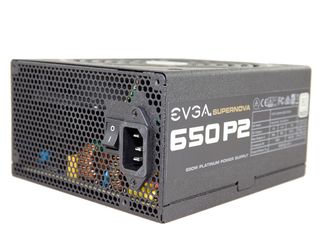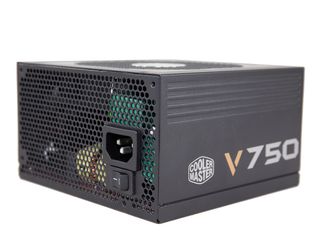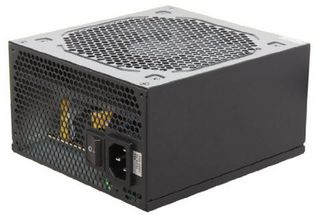EVGA SuperNOVA 650 P2 PSU Review
Why you can trust Tom's Hardware
Load Regulation, Hold-Up Time And Inrush Current
To learn more about our PSU tests and methodology, please check out How We Test Power Supply Units.
Primary Rails And 5VSB Load Regulation
Load Regulation testing is detailed here.








Hold-Up Time
Our hold-up time tests are described in detail here.


The registered hold-up time surpasses the ATX spec's minimum, so the SuperNOVA 650 P2 passes the hold-up test. We didn't have any doubt that it wouldn't; Super Flower uses a large bulk cap for this unit's capacity.
Inrush Current
For details on our inrush current testing, please click here.


The inrush current is pretty low with 115V and 230V input. Super Flower might have used a large bulk cap, but it also implemented a suitable NTC thermistor to efficiently suppress inrush current during the PSU's start-up phase.
Load Regulation And Efficiency Measurements
The first set of tests reveals the stability of the voltage rails and the PSU's efficiency. The applied load equals (approximately) 10 to 110 percent of the maximum load the supply can handle, in increments of 10 percentage points.
We conducted two additional tests. During the first, we stressed the two minor rails (5V and 3.3V) with a high load, while the load at +12V was only 0.10A. This test reveals whether a PSU is Haswell-ready or not. In the second test, we determined the maximum load the +12V rail could handle with minimal load on the minor rails.
| Test # | 12V | 5V | 3.3V | 5VSB | DC/AC (Watts) | Efficiency | Fan Speed (RPM) | Noise (dBA) | Temps (In/Out) | PF/AC Volts |
|---|---|---|---|---|---|---|---|---|---|---|
| 1 | 3.558A | 1.983A | 1.989A | 0.979A | 64.78 | 87.09% | 0 | 0 | 46.78 °C | 0.955 |
| 12.143V | 5.038V | 3.312V | 5.102V | 74.38 | 37.42 °C | 115.0V | ||||
| 2 | 8.151A | 2.972A | 2.990A | 1.174A | 129.75 | 90.30% | 0 | 0 | 48.00 °C | 0.971 |
| 12.136V | 5.033V | 3.310V | 5.090V | 143.69 | 38.20 °C | 115.1V | ||||
| 3 | 13.089A | 3.476A | 3.504A | 1.376A | 194.83 | 91.44% | 0 | 0 | 50.06 °C | 0.984 |
| 12.130V | 5.030V | 3.307V | 5.078V | 213.08 | 39.01 °C | 115.1V | ||||
| 4 | 18.029A | 3.976A | 3.992A | 1.575A | 259.75 | 91.72% | 0 | 0 | 53.49 °C | 0.989 |
| 12.125V | 5.026V | 3.304V | 5.066V | 283.19 | 40.65 °C | 115.1V | ||||
| 5 | 22.630A | 4.973A | 4.999A | 1.780A | 324.76 | 91.56% | 0 | 0 | 54.88 °C | 0.992 |
| 12.121V | 5.022V | 3.300V | 5.053V | 354.71 | 41.04 °C | 115.1V | ||||
| 6 | 27.233A | 5.975A | 6.003A | 1.979A | 389.73 | 90.97% | 615 | 26.5 | 43.38 °C | 0.993 |
| 12.117V | 5.018V | 3.297V | 5.040V | 428.40 | 54.27 °C | 115.1V | ||||
| 7 | 31.848A | 6.984A | 7.012A | 2.185A | 454.66 | 90.47% | 615 | 26.5 | 43.32 °C | 0.994 |
| 12.106V | 5.015V | 3.294V | 5.028V | 502.53 | 53.56 °C | 115.1V | ||||
| 8 | 36.476A | 7.984A | 8.018A | 2.389A | 519.65 | 89.77% | 940 | 35.6 | 44.28 °C | 0.995 |
| 12.098V | 5.010V | 3.291V | 5.013V | 578.88 | 54.76 °C | 115.1V | ||||
| 9 | 41.534A | 8.482A | 8.540A | 2.394A | 584.66 | 89.20% | 940 | 35.6 | 45.49 °C | 0.995 |
| 12.089V | 5.007V | 3.290V | 5.008V | 655.47 | 56.23 °C | 115.1V | ||||
| 10 | 46.543A | 8.997A | 9.036A | 2.500A | 649.60 | 88.51% | 940 | 35.6 | 45.89 °C | 0.995 |
| 12.083V | 5.004V | 3.287V | 4.999V | 733.90 | 56.85 °C | 115.1V | ||||
| 11 | 51.964A | 9.001A | 9.038A | 2.500A | 714.56 | 87.91% | 1310 | 44.8 | 45.94 °C | 0.995 |
| 12.073V | 5.002V | 3.285V | 4.995V | 812.82 | 57.16 °C | 115.1V | ||||
| CL1 | 0.101A | 12.009A | 12.005A | 0.004A | 100.97 | 84.96% | 615 | 26.5 | 42.95 °C | 0.965 |
| 12.160V | 5.010V | 3.295V | 5.124V | 118.85 | 52.08 °C | 115.1V | ||||
| CL2 | 54.124A | 1.002A | 1.003A | 1.001A | 666.70 | 89.11% | 940 | 35.6 | 45.69 °C | 0.995 |
| 12.070V | 5.024V | 3.301V | 5.074V | 748.19 | 54.90 °C | 115.1V |
Voltage regulation is good on all rails; only Seasonic's high-end Platinum-rated platform manages to outperform EVGA's offering. The 650 P2 also proves to be highly efficient, although it doesn't manage to clear the 80 Plus Platinum requirements with 50 and 100 percent of its maximum-rated-capacity loads. We should stress, however, that we tested the PSU under much harsher conditions than the 80 Plus organization uses. On top of that, the unit was within 0.5 percent of its required thresholds. With this we can assume that under normal conditions, the PSU won't have a problem satisfying the Platinum requirements.
Still, we don't think an operational temperature of 23 °C is realistic inside of a typical chassis. Since we want to push the PSUs we're testing to their limits, we continue to crank up the heat inside our hot-box. When it comes to evaluating PSUs, high ambient temperatures can separate the good ones from the rest.
As far as noise output goes, the small EVGA unit is dead silent up to the 70 percent load test; its fan started to spin faster only after passing that point. We had to overload the PSU in order to make the fan rotate at full speed. And even under those conditions the noise wasn't bad compared to other power supplies we've reviewed. ECO mode lasts quite a while, which means that in a typical machine, the fan will barely spin.
Current page: Load Regulation, Hold-Up Time And Inrush Current
Prev Page A Look Inside And Component Analysis Next Page Efficiency, Temperature And NoiseStay on the Cutting Edge
Join the experts who read Tom's Hardware for the inside track on enthusiast PC tech news — and have for over 25 years. We'll send breaking news and in-depth reviews of CPUs, GPUs, AI, maker hardware and more straight to your inbox.
Aris Mpitziopoulos is a Contributing Editor at Tom's Hardware US, covering PSUs.
-
cst1992 $120 is a good price for a Platinum 650W PSU. That used to be the price for Gold units with half the warranty a couple of years ago.Reply -
TbsToy Your reviews are so jaded. Anything for the ad dollars, right? Not going to go all the way here but as an example but why didn't you compare the Antec EA 650 Platinum power supply for a more fair apples to apples test instead of the Bronze 80 one? Yeah, I, know why. You guys just keep going down hill.Reply
Walt Prill
-
Aris_Mp Before you dive into conspiracy theories etc. can you tell me where you saw the bronze Antec unit? Last time I checked the Antec Edge 650 which is included in the comparison has Gold efficiency. Also I can only include PSUs which I tested with this setup and the EA 650 Platinum isn't among them. And even if it was it wouldn't do better than the EDGE 650 since it uses a budget, ACRF platform which offers average load regulation and ripple suppression.Reply
And a piece of advice, better have your facts straight before you jump into conclusions.
Merry Christmas to all! -
cst1992 @Aris_Mp I think he's talking about the EA-650 Bronze on the first page of the review. The EA-650 Platinum is also on Newegg, and it's actually cheaper than the EVGA by $6.Reply
http://www.newegg.com/Product/Product.aspx?Item=9SIA24G28N5004&cm_re=antec_ea_650-_-17-371-056-_-Product
Now that I think about it, none of the products on the first page are similar in price to this one while being Platinum, and the CoolerMaster is actually the wrong wattage. Why is that? The products should be similar in price, at least. -
Aris_Mp I have no control on the product prices shown on the first page. This is an automated script that looks on all PSUs mentioned in the review and depicts their prices. Also since I don't have so many PSU reviews with 115V input, I have to include into my comparison charts, at least in some cases, PSUs that have slightly different capacity and features than the one under test. Once I have a capable PSU database this won't be a problem any more.Reply
Also including a product in a pricing list is another thing with including it into a comparison chart. In any case I advice all of you not to lose the forest for the tree(s) and read the entire review before you draw any conclusions or make purchase decisions. Finally, in a PSU review the final rating is based on facts and numbers so the final rating is easily supported. -
Take_Out I have been in electronic/electrical power distribution field since 1964 (old fogie, used slide rules {slip sticks} to study field effect transistors, heh) working/studying/troubleshooting in a large assortment of types and uses of devices for military and industrial and residential.Reply
In gaming computer type PSU builders (not brandnames put on them), I like Super Flower, Seasonic, Antec and used to like PC Power and Cooling before the takeover, donno now. Forgot some I am sure. Use the performance list here to make PSU decisions in a fair manner.
I build gaming computers for family and friends and they kick ass for the cost and last a long time usually unless a part fails. 8800GT and 560ti video cards I liked. Now like GTX 970s and 960s for my money level. 750 and 750tis and some others nearby are only Direct X12 cards in 7 series lineup, go look it up in Wikipedia, despite deceptive advertising on Newegg that all 7 series cards are Direct X12 compatible, not like them. Must be nubies there for the holidays.
HATE changing OS just cause engineers need something to do, darn it. I know I simplify it, but it is THERE that they make you spend money and worse, learn their "NEW" way to make it work, how utterly fantastic for them. I think engineers are behind a lot of viruses so they can fix some of them, although there are bad actors for sure out there with extremists.
I think buying a well known brand (Lenovo, Dell, ASUS, etc) of regular NEW i5 4590 plain model cpu or so computer (absolutely NOT small form factor or s or t on end, ugh, regular-sized ATX board mid tower with 8 or 16GB of RAM, and a 1TB HrdDrve WD or Seagate included in price of about 500USD, then add a 240 or 500GB SSD recommended by Tom's, for OS and top games you play to load a lot faster by a wide margin, really. Steam takes up a LOT of room. Then put a good Nvidia GTX-970 or 960 into it and game away with a darn warrenty. Plus engineers have something to do with making all the parts work together, is quite a job........ really. People who make money depend on those types of puters to feed thier kids, they have to work right, not just having fun with them.
Really like Intel cpus and Nvidia 900 series video cards right now, dem magic, was a time I liked 3DFX(VooDoo2)SLI and ATI(RAGE) cards, even AMD cpus a decade or so back with the X2 64bit Athlons that buried Intel for a while.
TUROK Dinosaur Hunter is coming back, OMGosh. Game hooked me on 3D gaming for real.
EVGA seems to be broadening their approach to vending PSUs. Might prove interesting.
Usually the companies that have stayed in business for many decades are doing something right and it tells. EVGA hasn't yet, but seems to be trying hard, I like their brand of video cards and they support them well.
seriously something wrong with me, I could keep going and going, sorry....
Merry Christmas. -
f-14 too expensive a good PSU should cost $10 per 100w on average nd at the cheapest be the price of the amps on the +12v rail so in this PSU's case average price $65 and sale priced at $54.Reply
-
TomaszC I have a question regarding Fan RPM, Delta Temperature And Output Noise for load range 300W-400W - does the fan RPM changes smootchly in temperature/load function, or just switch from 0RPM to 800RPM?Reply


